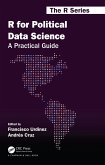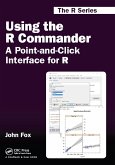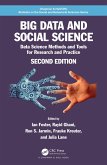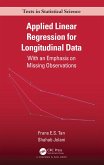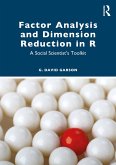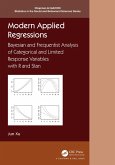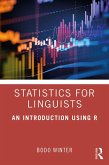Dieser Download kann aus rechtlichen Gründen nur mit Rechnungsadresse in A, B, BG, CY, CZ, D, DK, EW, E, FIN, F, GR, HR, H, IRL, I, LT, L, LR, M, NL, PL, P, R, S, SLO, SK ausgeliefert werden.
- Mine Çetinkaya-Rundel, University of Edinburgh, Duke University, and RStudio.
"This book is a great resource for students learning methods as well as for researchers migrating to R. The volume introduces a wide range of topics, including foundations of R, conventional statistical models, text analysis, networks, maps, and web mining. And there is more! The examples based on Latin America make the book substantively interesting and enjoyable."
- Aníbal Pérez-Liñán, University of Notre Dame
"As others who lacked the capacity to work in R, I was lagging behind regarding my capacity to produce cutting edge empirical analyses for my research. This textbook and its applied pedagogy and examples, significantly reduced the costs of catching up. I highly recommend it, both as a textbook and as a guideline for anyone interested in learning R on their own."
- Juan Pablo Luna, Pontificia Universidad Católica de Chile
"With its tutorial approach, R for Political Data Science builds readers' R literacy without assuming any prior experience with the language. By the end, your practical political data science toolkit will be well-stocked, you will be more motivated to take the next step and study the mathematical underpinnings of the methods discussed throughout, and using R professionally will no longer feel like a pipe dream (pun intended!)."
- Santiago Olivella, University of North Carolina - Chapel Hill
"If you have a background in Political Science, this is THE BOOK you need to start your journey into R. Using up-to-date tools, this book guides you step-by-step through the process of translating data analysis into political questions. R for Political Data Science not only covers a wide range of techniques and R packages, but also uses Latin American datasets that make the topics covered interesting for a broader audience."
- Riva Quiroga, co-founder of R-Ladies Santiago and R-Ladies Valparaíso, editor of The Programming Historian and chair of the Latin-R Conference
"The monograph belongs to The R Series, and presents a reference textbook on R language with a semester course on statistics with application to estimations on real political data...Each chapter suggests references on the recent sources, exercises, and links to numerous websites with data, packages and other R facilities. The book is convenient as a textbook for students, and is equally helpful for researcher and practitioners. The main material in the book consists of R codes, that supplies the readers with amazingly useful tools of modeling not only in political but in a wider area of applied social and other sciences, wherever the statistical analysis is required."
- Stan Lipovetsky, Technometrics, April 2021



